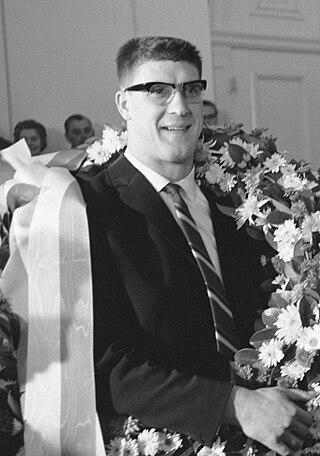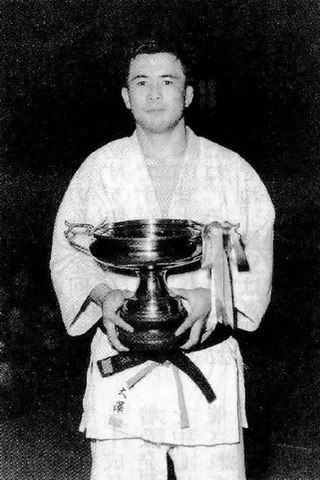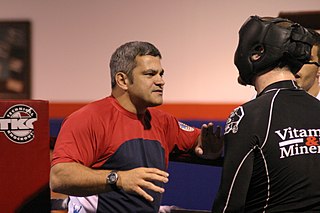Related Research Articles

Antonius Johannes Geesink was a Dutch 10th dan judoka. He was the first non-Japanese judoka to win gold at the World Judo Championships, a feat he accomplished in 1961 and 1965. He was also an Olympic Champion, having won gold at the 1964 Summer Olympics in Japan, and won a record 21 European Judo Championships during his career.

Yasuhiro Yamashita is a Japanese judoka. He currently works as an instructor or advisor for numerous organizations, including Tokai University, the International Judo Federation, and the All Japan Judo Federation. He retired from competitive judo on 17 June 1985 after a remarkable career where he won five gold medals in international competitions and marked 203 consecutive victories until his retirement where he went undefeated his entire career against non-Japanese wrestlers. He received the Japanese National Prize of Honor on 9 October 1984. He is considered by many to be the greatest judoka ever.

Michael Lee Swain is one of the most successful American judoka. He competed in countless international competitions. He is now the VP of Martial Arts at Dollamur, Sports LP where he develops and sells Martial Arts equipment and continues to be a spokesperson and board member for USA Judo.

Johannes Cornelius Bluming was a Dutch martial artist, instructor and actor. Known as a pioneer in a variety of martial arts, Bluming held 9th dan in Judo, 10th dan in Kyokushinkai Karate and 10th dan in Hapkido. He was also the coach of two-time Olympic champion Willem Ruska.
Philip S. Porter was a martial artist in the United States.
Toshihiko Koga was a Japanese judoka, 9th degree black belt and Olympic champion who competed in the –71 kg and –78 kg divisions. Koga is regarded as having perhaps the greatest ippon seoi nage ever. He died of cancer on 24 March 2021 at the age of 53.
Luis Juniti Shinohara is a retired judoka from Brazil, who won a total number of three medals at the Pan American Games during his career. He also competed at the 1980 Summer Olympics and the 1984 Summer Olympics.

Shinichi Shinohara is a Japanese television personality, judoka and winner of two gold medals at the 1999 World Championships in Birmingham. To Shinohara's disappointment, French champion David Douillet did not compete at Birmingham due to back injury; Shinohara was quoted as saying, "Even though I lifted the double crown at the worlds, it won't mean anything as long as people say it was won in Douillet's absence." Douillet had previously been declared victor at the 1997 championships in Paris after a French judge gave Shinohara a controversial penalty.

Isao Okano is a retired judoka who competed in the middleweight division (–80 kg) in the 1964 Summer Olympics.

Henri Courtine was a French judoka.
The Brazilian jiu-jitsu ranking system signifies a practitioner's increasing level of technical knowledge and practical skill within the art. Colored belts worn as part of the uniform are awarded to the practitioner. The ranking system shares its origins with the judo belt-rank system, but the Brazilian system incorporates some minor differences from Judo such as a division between youths and adults and the issuance of stripes and degrees. Some differences have become synonymous with the art, such as a marked informality in promotional criteria, a focus on competitive demonstration of skill, and conservative promotion.
In judo, improvement and understanding of the art is denoted by a system of rankings split into kyū and dan grades. These are indicated with various systems of coloured belts, with the black belt indicating a practitioner who has attained a certain level of competence.

Toshirō Daigo was a Japanese judoka who was the Chief Instructor at the Kodokan and a manager of the Japanese national team.

Yoshimi Ōsawa was a Japanese judoka. Before his death, he was the only living Kodokan 10th dan, having been promoted at the New Year Kagami Biraki Ceremony, 8 January 2006 along with Toshiro Daigo and Ichiro Abe.

Felipe Kitadai is a judoka from Brazil. He won a bronze medal at the 2012 Olympics and a gold at the 2011 Pan American Games. He also won gold medals six consecutive times in the Pan American Games Judo Championships: at 2011 Guadalaraja, 2012 Montreal, 2013 San José, 2014 Guayaquil, 2015 Edmonton and 2016 Havana.

Antonio Ricardo Jardim Libório is a Brazilian jiu jitsu black belt under Grand Master Carlson Gracie. He is the co-founder of American Top Team (ATT) and Brazilian Top Team (BTT), the founder and CEO of Martial Arts Nation and the International Brazilian Jiu-Jitsu Institute (IBJJI), and also a professor of BJJ at the University of Central Florida.

The Great Victory is a 2014 Brazilian sports drama film based on the book Aprendiz de Samurai by Max Trombini. This film adaptation was directed by Stefano Capuzzi Lapietra. Starring Caio Castro and Sabrina Sato, it tells the true story of the judoka Max Trombini, who had a humble and troubled childhood. Through judo, the boy becomes involved with martial arts principles and thus learns to settle down emotionally. He subsequently starts building a career, becoming one of the greatest judo coaches in Brazil.
Hayward Nishioka is a Japanese-American community college physical education instructor and former judo competitor.

Daniel Borges Cargnin is a Brazilian judoka. He won the bronze medal at the 2020 Olympic Games and the 2022 World Championships, in addition to being three-time Pan American Judo champion.
References
- 1 2 3 "Massao Shinohara: Brazilian Judo in Mourning". www.ijf.org.
- ↑ "Sensei Massao Shinohara receives his 10th Degree". Sampa Martial Arts and Fitness. November 25, 2017.
- ↑ "Brazilian Judo 10th Dan Dies". Black Belt Magazine. December 8, 2020.